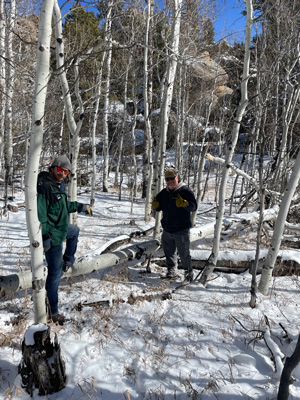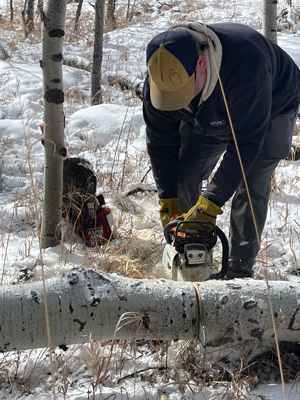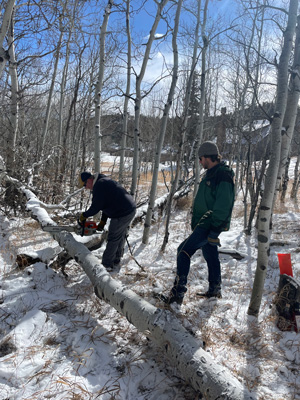Reliable and Sustainable Aspen Supply
We hand cut the majority of the aspen wood we use in our whiskies from family property off of Weston Pass in the Mosquito Mountain Range in Central Colorado. Utilizing the family property in Park County, Colorado ensures we will have a reliable supply for decades to come of whiskey production. That being said, we are working with other ranches and private property owners around Colorado to help work on reducing our reliance on trees from a single property. Wildfires, fungi, and changing climate conditions present potential threats to the aspen tree so having multiple harvesting locations will help us manage any of these or other potential issues. Not to mention, we are exploring aspen from different areas and see if there are any notable differences in flavors imparted into our whiskey. Maybe we will find Denver aspen trees have slight differences than ones harvested at higher altitudes!

Criteria for Selecting Aspen Trees
When assessing which trees to harvest from any aspen stand, we focus on older and freshly fallen trees for several reasons. First off, removing the older trees growing in the groves, contributes to the aspen stand regenerating. As long as the aspen stand is healthy, when trees are removed it causes “vegetative regeneration by shoots and suckers arising along its long lateral roots.” We are helping stimulate new growth and strengthen the overall health of aspen trees in the areas we are harvesting.
Benefits of Harvesting Older and Fallen Trees
Secondly, by removing the freshly fallen trees, we are helping clear space for the new growth to expand into. Without the added room we help create by removing trees (both standing or fallen), the new growth has the potential of being “choked” out when competing in limited space. It should be noted that since we only use 10 – 20 trees from the family property (depending on height and diameter) per year, we are able to leave ample fallen tree trunks to decompose, contributing to the required addition of new nutrients to sustain healthy soil for all the forest’s vegetation.

In addition, focusing on the older and freshly fallen aspen trees, we help remove potential fuel for forest fires. Despite aspen trees growing very well in fire-burn areas, we want to help ensure when fires do break out that they do not have excessive fuel causing undue destruction far over-shadowing the natural benefits of wildfires.
Lastly, by helping cull the aspen stands of olders and dead trees, it helps stimulate cross pollination of other aspen groves in the areas we harvest.
“Very few aspen seedlings survive in nature due to a variety of reasons including the short time a seed is viable, lack of moisture during seed dispersal, fungi, adverse day/night temperature changes, and unfavorable soil conditions.”
If we can help the aspen trees pollinate, creating as many seedlings as possible, the chances of new aspen stands growing and surviving increases. Anything we can do to help the aspen tree the better!
Source: US Forest Service
Using Sustainable Resources in Whiskey Production
We use vegetable-based bar-chain oil on our chainsaws to ensure only the flavors from the aspen wood are imparted into our whiskies. The bar-chain oil is essential to running chainsaws but as the movement of the chain distributes the oil along the guide bar and thus the chain, some of that oil gets spun off the chain onto the ground and the wood that is being cut. Using a vegetable-based oil ensures the wood does not get any petrol or other contaminants that have the potential of getting into our whiskey or into the soil that nourishes the aspen (and other growth on the property).
